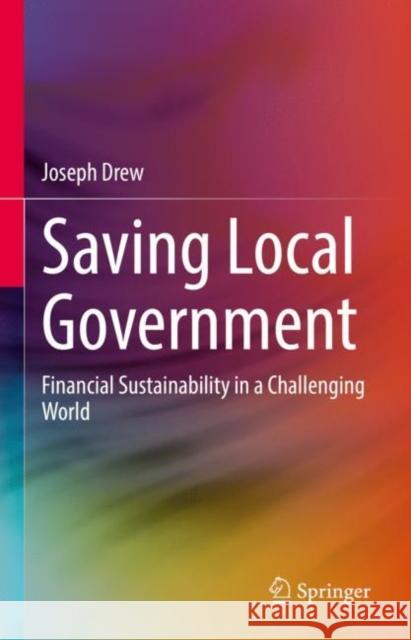Saving Local Government: Financial Sustainability in a Challenging World » książka



Saving Local Government: Financial Sustainability in a Challenging World
ISBN-13: 9789811643316 / Angielski / Twarda / 2022
Saving Local Government: Financial Sustainability in a Challenging World
ISBN-13: 9789811643316 / Angielski / Twarda / 2022
(netto: 460,04 VAT: 5%)
Najniższa cena z 30 dni: 424,07
ok. 16-18 dni roboczych.
Darmowa dostawa!
Joseph Drew is Associate Professor of Public Policy and Local Government in the Institute for Public Policy & Governance at the University of Technology Sydney and adjunct Professor at the Department of Business Administration, Tokyo Metropolitan University. His research interests focus on public finance, performance measurement, local government structural reform, natural law philosophy and governance. Previously he worked in executive positions in the retail banking sector. His work has been recognised in the 2004 Australian College of Educators awards and he is the recipient of the University Medal (Griffith University, 2003) and the D H Drummond award (University of New England, 2014). Recent publications have appeared in Public Administration, Local Government Studies, Public Money & Management, Public Administration Quarterly, Publius: The Journal of Federalism, the Australian Journal of Public Administration, and Policy & Politics. He has consulted with numerous Victorian, Tasmanian, South Australian and New South Wales councils on accounting, finance and economic matters. Joseph has also been called as an expert witness for multiple Australian State and Federal Government Upper House inquiries into local public finance, as well as working on a number of projects of national significance abroad. His new book – Reforming Local Government – BECAME available from Springer IN September 2020. Joseph serves on the Editorial Board of Australia’s highest ranked public administration journal – the Australian Journal of Public Administration.
This book focuses squarely on the problem of saving local government in the context of extraordinary financial challenges being faced across the globe. Saving Local Government is written principally for practitioners and employs a ‘conversational’ tone which makes complex theory both engaging and accessible. It augments world-best scholarship with Professor Joseph Drew’s extensive practical experience in guiding local governments away from the brink of financial insolvency. It is thus a ‘must read’ for local government executives, Mayors, Councillors and the regulators that oversee the sector.
In Saving Local Government Professor Drew also makes a number of important contributions to address significant gaps in the scholarly literature. In particular, the book includes extensive treatment of de-amalgamation, applied natural law philosophy, Aristotelian epistemology for evaluating public policy success, as well as alternatives to financial administration. The work is therefore also compelling reading for scholars.
1997-2026 DolnySlask.com Agencja Internetowa
KrainaKsiazek.PL - Księgarnia Internetowa









